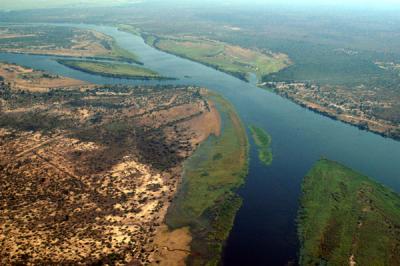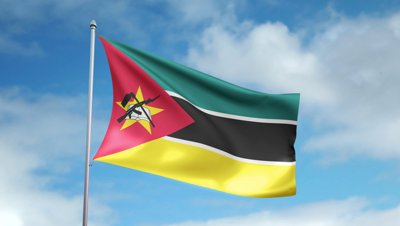A postcard from the Zambezi

LIVINGSTONE, Zambia -- Late in the afternoon we fired up the Isuzu Wizard and travelled down a long, dirt road, down the valley toward the river - across that river were Zimbabwe and Botswana. We boarded the pontoon which would take us across the Zambezi. The sun set behind us into great masses of tree-lined banks, behind the softly rolling hills, throwing long shadows over the opaque water, and lighting the riverbanks in the late afternoon.
Once across,we had many hours still on the road, and were slightly daunted by a warning we were given that morning. We were told the roads of Botswana, after dark, were lousy with elephants, and that it would take all our wits not to write the car off into the side of a five-ton pachyderm. Fearlessly, we ploughed on, James watching the far distance whilst I looked in the near treeline for anything elephantine and car-destroying.
Herds of all manner of animals roamed the edges of the road including colossal yellow baboons and zebras. What surprised us most about Botswana motoring was the quality of the road. After the crushing agony of Zambian highways, we had come to expect the worst. But in Botswana, the roads are neat and lovely and pothole-free, and even had cat’s eyes! – A fine British innovation which practically brought tears to our eyes.
We saw our fair share of elephants too, but never did they roam beyond the verge, and as the sun set completely, every boulder, bush and tree looked like the immense, hulking form of a bull elephant, which duly kept us alert.
The main road cuts through plains so flat and so vast that one can drive through them at breakneck speed without seeing a single thing other than the arrow-straight road ahead, and the horizon on all sides. It was hypnotic, and became more so when night was upon us. For then, the stars were scattered above, and the cloud-like form of the Milky Way stuck out coolly like smoke from a wood-fire.
Arriving at midnight we camped in the Nata Sanctuary – a reserve for the innumerable and beautiful birds of Botswana. Throughout the night we heard the cawing of guinea fowl, and in the morning saw egrets, terns, storks and cormorants as we left the camp and drove to Francistown and on to Zimbabwe.
Zimbabwe, with its tyrannical leader Robert Mugabe, continues to suffer under his regime of racism, election-rigging and horrific violence nevertheless, Zimbabwe is a beautiful, wonderful country, and every one citizen we met was friendly and affable.
In fact, we were wholly surprised to find an easy, even enjoyable, passage through. Several hours from the border, increasingly frequent rock outcrops sprouted up through the land. We came upon one, hundreds of metres high, shaped like an almighty burial mound in an otherwise flat section of land. Its sides were smooth and polished, almost like Australia’s Uluru. The country is rife with piles of balancing rocks which stand freely and impressively, cut from the earth by erosion, leaving just sturdy granite boulders. Much of the land near where we stayed in Masvingo was almost lunar, stretching out in unbelievable planes of rock-face, gullied in parts by waterways, haunting in their starkness. We drove through Zimbabwe to the border of Mozambique, the final country in our trip.
Mozambique was by some distance the worst leg of the journey. It began poorly, with us finding ourselves stuck in that no man’s land, beyond the Zimbabwe border, before Mozambique immigration. An incomparable official, tried to charge us extra for the visas, which were, already, the most expensive of the trip. After a time in the seventh circle of immigration, a kindly Mozambican offered to help us by speaking to the official and we eventually made it in. The fact the country’s flag has a big Kalashnikov on it should have been a clue about the demeanour of its officials.
Across the border, we once more found ourselves in a new world. Though, whilst home to magnificent terrain, we did not enjoy Mozambique. The people seemed not to have the friendly disposition I’ve become so accustomed to in Africa, and the poverty was more overt, more cruel. Street children constantly begged with desperate faces. It was hard to turn away from the faces of young boys in rags, walking through towns barefoot with thin, scrawny limbs. The roads were lined with wooden shacks, broken walls and sheet metal. We were in a part of a very poor country which never sees tourists. It felt uncomfortable.
There was something disquieting and violent. Perhaps we were thinking on it too much, but those little details, such as the pump-action shotgun in the hands of a petrol station attendant, the AK47-clad flag waving in the breeze, were hard to escape. Mozambique’s history is keenly entwined with violence and war, and has remained so up until recently and even now the southern region is presently embroiled in guerrilla warfare.
The sheer size and comparative poverty of the country results in poor infrastructure in rural locations; the road became very difficult, craterous in places, with enormous potholes stretching across the road, requiring a dead slow pace to tackle. We drove toward Tete through the night, which might have been inadvisable but in hindsight is hard to tell. Certain experiences had given us a bias, and the country appears genuinely much safer than we inferred.
We reached Tete, a scorched city surrounded by fat baobabs and sited on the Zambezi, late at night. With no one around and not remotely knowing the region we sought out the overpriced Hotel Zambeze. A few azungu sat outside smoking and drinking coffee, playing a board game. A pair of beggar children wandered around our car as we arrived, trying to find any way of helping, making a big show of testing the locks for us and vowing to guard the vehicle. There is something so much worse about homelessness in a city, despite the comparative affluence in urban areas. We gave them our last biscuits and drove North-East towards the Malawi border. It would be the last time we saw the Great Zambezi as we crossed the Samora Machel Bridge.
The road from Tete to the border was a lunar landscape of deep craters and took an unbearable four hours to pass. Our trusty car wheezed over ever bump, each new dip promising to pop one of our useless tyres and set us on our side. We made it through and were relieved to be out of the country and back into Malawi, to a friendly border police and an amicable populace. The roads were navigable, the hills green and broad and muscular on both sides as we descended into a valley and found our way north of Blantyre to the impressive Lakeshore Road which spans much of the country along Lake Malawi.
As day became night, the horizon on the lake was lined with the lanterns of fishermen, glowing little amber refractions of light in a dark, calm expanse of freshwater. We relaxed and sped up from Salima, toward Nkhata Bay.
We trundled into Mwaya at midnight, having a final beer before retiring. It was a relief to be back in the known quantity of Malawi, back on the Lake in a country I’ve truly grown to love over the past five months.
We travelled through five countries in just 10 days, and made a pretty decent dent in central Africa. The terrain we crossed varied massively, as did the climate, the people, the flora and fauna, the milieu. Africa remains, as always for me, a land of extreme contrasts, polarised at every turn, but contained largely of fabulous, kind people and places of stunning, otherworldly beauty. The simplest of tasks becomes an adventure and for Europeans it feels like a continent of true and incomparable freedom. I appreciate that this is a very privileged opinion, and for millions of Africans the Dark Continent is cruel and brutal and oppressive. In this respect, the kindliness of almost everyone we met is even more astonishing. I only hope that in my last few months here I can contribute something real to a place which has been so good to me. Writing this I’m sitting by the lake in Nkhata Bay, the sun dipping below the horizon. Dry season has shaped the land into a new world, and mangoes are appearing on the trees once more.
Africa is an addictive place; it gets under your skin and becomes an oxygen all of its own, and has its own tremendous highs, lows, ebbing in inequality and deprivation, yet flowing miraculously in natural beauty and, more than anything else, the generosity of its citizens which would convert even the most stalwart misanthrope.
(Edited by Charlotte Trundley)




